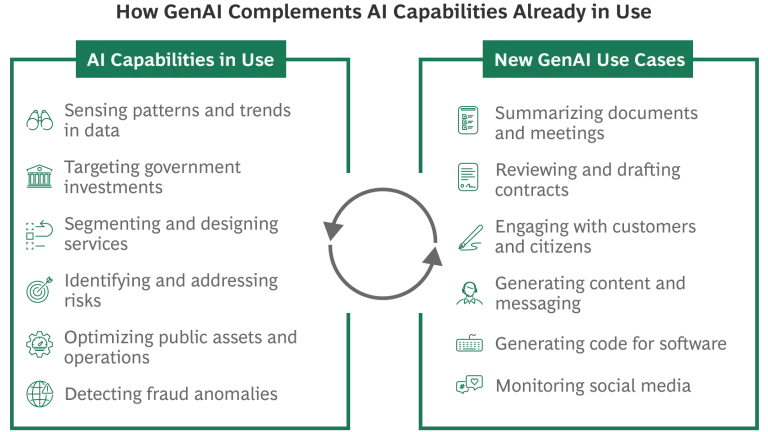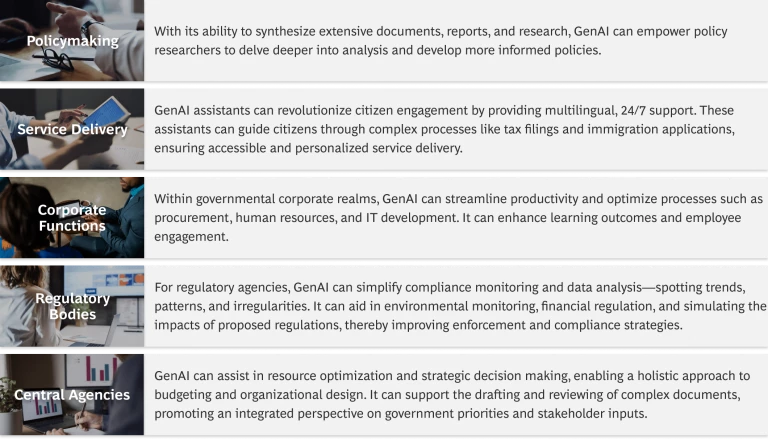Generative AI provides an unprecedented opportunity for governments around the world to deliver public services with greater efficiency and impact. The potential value is remarkable: BCG research suggests that the market for GenAI applications for the public sector will grow at more than 50% per year, with an estimated productivity value of $1.75 trillion per year by 2033 across all national, state or provincial, and local governments.

How can public sector leaders capture the transformative potential of generative AI? First, they need to understand how GenAI can create value for them. GenAI can increase public sector productivity by improving decision making at scale while raising the quality and range of services that governments offer.
To make the most of these technologies, public sector organizations will need to address a number of risks—including those related to accuracy and data ownership as well as the potential for AI tools to exhibit bias in their outputs. Leveraged responsibly, however, AI, GenAI, and other advanced data systems can enable governments to drive maximum public impact while lowering the cost of providing essential services.
Embracing the Opportunity
GenAI heralds a significant shift in public sector efficiency and service delivery, promising to transform mundane tasks and free up time for higher-value work. Potential applications span several key areas:

With GenAI and other AI systems, fostering an innovative culture is crucial. This involves training staff on GenAI tools, aligning recruitment with future skill requirements, and forming strategic partnerships for technological advancement.
Each organization’s GenAI journey will be different, based on its particular needs and service mandates. But iterative development will be crucial, with governments integrating GenAI tools into their current operations and gradually enhancing their technological and organizational frameworks. Such an approach will not only streamline government functions but will also help prepare the workforce for a future augmented by AI technologies.
Confronting the Risks
For government leaders, navigating the intricacies of AI implementation in the public sector brings unique challenges, given the impact on citizen lives. The risks are substantial: GenAI outputs that are presented convincingly could be factually incorrect, or they could lack critical context. Improperly trained or monitored AI models could put sensitive data at risk.
Establishing a responsible AI (RAI) framework is crucial to harnessing AI's potential while safeguarding against its risks, maintaining public trust, and ensuring the delivery of superior services. Key priorities for embedding RAI include:

By prioritizing these areas, governments can navigate the GenAI landscape responsibly, ensuring innovation is balanced with ethical considerations and risk management.
Getting Started
To harness GenAI's full potential, government leaders should focus on five critical success factors, enabling scalable opportunities and enhancing service delivery:
- Prioritize high-value use cases. Begin by identifying and prioritizing opportunities that offer the most significant benefits to citizens and the government. Early pilots are crucial for gaining insights and developing skills.
- Emphasize learning. Facilitate learning and skill development during the experimentation phase. Track and share success stories across the organization, and as GenAI use matures, shift toward aligning efforts, capturing synergies, and providing central support.
- Make foundational investments. Prepare for scaling beyond initial pilots by enhancing workforce skills, establishing governance, and building the necessary technological and data capabilities for advanced GenAI applications.
- Establish responsible AI guardrails. Establish responsible AI frameworks to mitigate the risks of the technology and foster innovation with confidence.
- Build a leadership and innovation culture. To gain the full benefits of AI and GenAI, government leaders must be actively involved in implementing the technology and promoting a culture of experimentation within the organization.
As GenAI evolves, it presents numerous opportunities to augment government services, making them more efficient and impactful. By taking a proactive approach, governments can leverage GenAI to improve citizens’ lives in a meaningful way.







